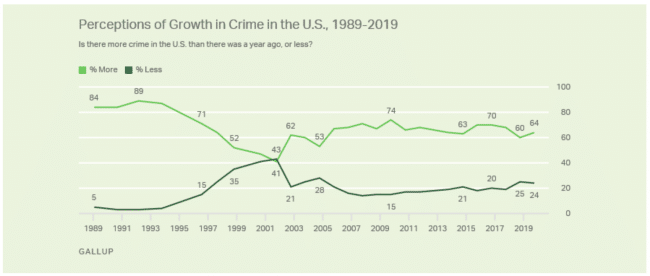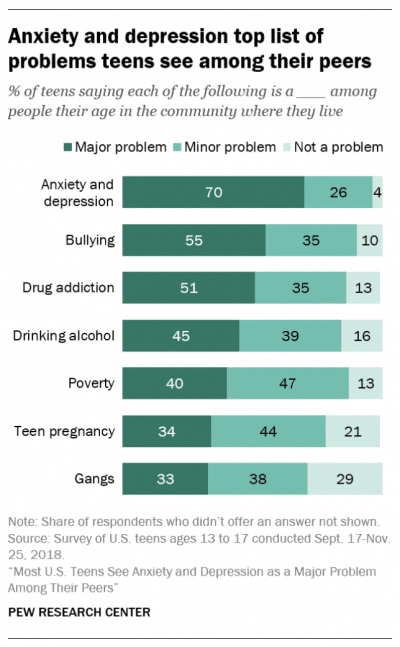Security and Prosperity Are Both About Perception

Many think security is about ensuring nothing bad happens. They think we’re either secure or not based on whether we stop the bad guys.
But while eliminating bad things from happening is a tidy goal to shoot for, I don’t think that’s the best way to think about security.
Security originally meant a lack of worry, not a lack of danger.
The etymology of the word security is fascinating. It’s a portmanteau from Latin that combines Se (without), and Cura (care/worry). So it’s literally focused on eliminating peoples’ worry, not sanitizing the world.
You can also make someone feel safe by eliminating all evil, but that’s hard.
So it’s possible to have a gap between reality and perception when it comes to security, where you are either in grave danger and feel secure, or are very safe but feel the opposite. As an example, the TSA could be providing little reduction of technical terrorism risk, but still provide security if it makes the public feel better.
Peers and media are two common sources of comparison.
What I find interesting is that prosperity and happiness seem to obey these same rules. It’s not about how well you’re doing on some objective scale; it’s about how well you think you should be doing based on your inputs.
And like security, you can be doing extremely well on numerous objective metrics (health, attractiveness, income, education, etc.), and still be deeply unsatisfied. Or you could be lacking in most of those and be one of the happiest people around.
This is why I have a serious problem > with the latest work from Steven Pinker and Matt Ridley >. They both speak of historic prosperity metrics as if they’re some official currency of human wellbeing.
They are ignoring the gap between reality and perception, and so is most of the conversation on this topic.

One place we see this is with peoples’ view of violent crime in the US. If you ask most people (around two thirds, actually), they think crime just keeps getting worse. But if you look at crime trends since the late 90’s, violent crime is quite low.
The perception doesn’t match reality, and the perception is what matters.

We see something similar with depression and suicide rates > in the US, with both rising massively in the last 20 years. In September of 2018, 96% of teens said anxiety and depression were concerns, with 70% saying they were a major concern. Combine that with suicide rates being up between 20-50% > in various groups and it’s clear we have a problem.
It’s not about how great the world is. Or how safe it is. And it’s especially not about comparing those things to the distant past. Humans aren’t inclined towards objective truth. We process narratives, not statistics.
This is especially true in the US.
The problem isn’t reality—it’s our perception of it. There are a thousand reasons to be angry and sad about the state of the world in 2020, but things were unfathomably worse 50 years ago for most people on this planet. Including for women and minorities basically everywhere.
Pinker and Ridley get that part right, but the answer is not to bludgeon people with the numbers. We have to recalibrate our sensors, reset our baselines, and re-evaluate what it means to be happy in the first place.
Both happiness and security describe how you feel about your state, not the state itself.
People are less religious today. They hang out less with their friends. They participate less in their communities. We have fewer life-long goals. And the (often artificial) success of others is thrust in our faces without end.
So we’ve stopped doing that which produces the deepest fulfillment, and we’ve maximized our visibility of—and sensitivity to—the factors that cause unhappiness. We see the rich more than ever. We see other peoples’ suffering more than ever. And new media thrives off of continuously showing us the extremes in every spectrum.
People are empty. They lack a framework for meaning. And in that state, people become vulnerable and hypersensitive to both the happiness and suffering of others. Rich people on vacation? Why don’t I make enough? People in a happy relationship? Why can’t I find love? The rich taking advantage of the poor? The system is broken and hopeless.
There is no positive data from Pinker or Ridley that can fix someone who responds to data in this way.

If someone lives in a first-world country in 2020, is healthy, has a university education, a high-paying job, and reasonable access to the mating pool, they’re already won the data lottery. They’re already doing better than 99.999% of everyone who’s ever lived on the planet. And the vast majority of people living today.
If someone in the socio-economic 5% is deeply unhappy, the answer isn’t to get into the 4%. And it’s not to tell them how bad people have it in the other 96% either.
We need to completely reset our expectations of life. We need to reset our baselines.
Mindfulness. Gratitude. Appreciation of the very basics. Studying history. Reading the biographies of great people who grinded for decades to achieve something. Determining a life purpose. Spending time thinking about someone other than yourself.
We have something like Happiness OCD, where perpetually adding positives to our lives does nothing to improve them.
These are some of the keys to resetting one’s baseline. It’s a different formula for everyone, but this is the hard work that must be done to address this epidemic of unfulfillment and meaninglessness.
People with OCD can wash their hands for hours and still feel they’re filthy. Paranoid people can feel unsafe in the best possible conditions. And we’ve somehow arrived at a similar state, where we can have everything in life and still feel miserable.
For those with OCD and paranoia we recognize their perception as the problem, and we address that instead of buying more hand soap and flak jackets.
It’s time to do the same with human meaning.
Buying another Tumi bag won’t help you, but neither will telling you how awesome it is that Tumi bags weren’t available to people in the 1500’s.
Notes
Let me be very clear about one thing here: I am not a doctor, or a psychiatrist, or any other type of medical professional. I know there are situations both in biology and in life that are causes for concern, and that must be addressed. Not everything is about perception, and not everything can (or should) be solved by "thinking about it differently". Hopefully you can tell the difference between the two in the piece.
Another interesting way to see how much perception matters is to imagine how Tiffany in Beverly Hills could be distraught and destroyed by getting the wrong color BMW for her 16th birthday, and could actually require hospitalization for her condition. And this could be true while a girl in Congo is overwhelmed with gratitude and joy at being given a set of colored pencils to go to school with, even though her family was killed just a few months ago. Comparing happiness and suffering is so often, and so much, about relative states within a person, not between people. And that’s why this resetting of baselines is so important.
Since a number of people have asked, no, I’m not feeling depressed. But thank you for asking! I write about this so much because I feel that human meaning is the ultimate problem to work on, as a life project. And in this case I was nagged by a single idea, i.e., that happiness and security describe how you feel about your state, not the state itself.